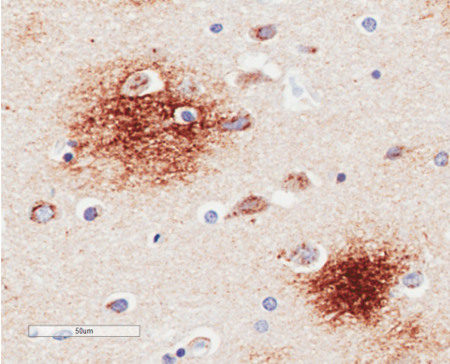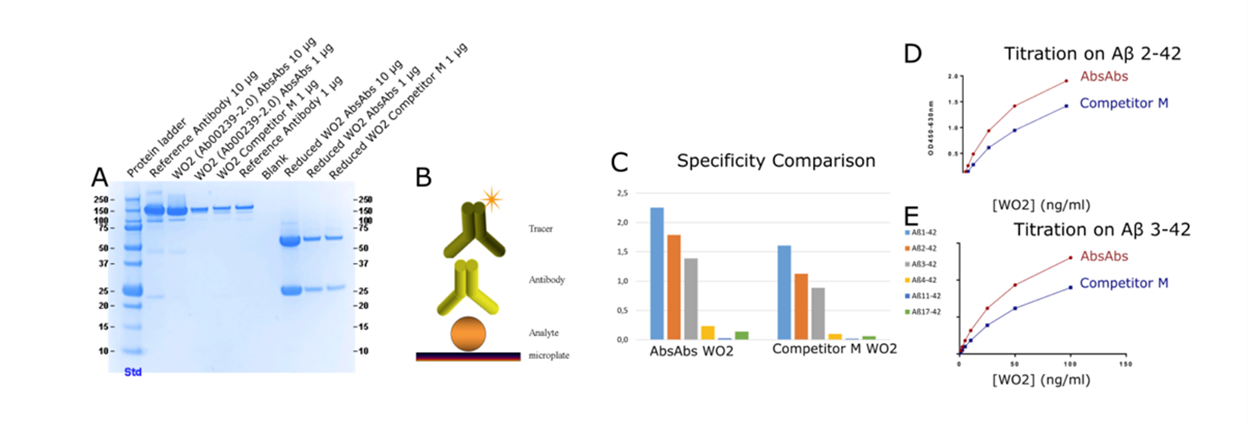
IHC staining of human Alzheimer’s disease hippocampus tissue using anti-Amyloid Beta antibody (Ab00714) 6E10.
Neurodegenerative diseases like Alzheimer’s disease (AD) and Parkinson’s disease (PD) are complex and prescient subjects of research, characterized by the accumulation of misfolded proteins in the nervous system that exhibit pathogen behavior (Armstrong, 2020). With as many as 6.2 million Americans with AD and nearly a million with PD in the United States alone, and those numbers expected to rise, the need for comprehensive understanding of the pathways that contribute to neurodegenerative pathogenesis is only growing. To aid in the specific, reliable detection and modulation of proteins like polysialic acid, amyloid beta, tau, and more, Absolute Antibody recombinantly engineers antibodies against relevant proteins implicated in neurodegenerative disease. Recent citations in the field of neurodegenerative disease research illustrate our antibodies in action.
Dual Role of Ribosome-Binding Domain of NAC as a Potent Suppressor of Protein Aggregation and Aging-Related Proteinopathies
This 2019 Molecular Cell study investigated the role of a protein complex called the nascent polypeptide-associated complex (NAC) in helping prevent protein misfolding, which is linked to diseases like Huntington’s and spinocerebellar ataxias. They found that NAC can act as a chaperone, assisting in the proper folding of various proteins, including those prone to misfolding. Specifically, they identified a part of NAC, called N-βNAC, which plays a major role in this chaperone activity. This study suggests that NAC could be a promising target for therapies aiming to prevent protein misfolding diseases. The researchers used the recombinant anti-amyloid beta clone 6E10 in our proprietary AbFab2™ recombinant F(ab2) format, based on Mouse IgG1 sequence with a short dimerization domain to improve stability and a his tag, for in vitro amyloid-beta protein aggregation assays in the presence of NAC.
A Novel Ex Vivo Model to Investigate the Underlying Mechanisms in Alzheimer’s Disease
In this Frontiers in Cellular Neuroscience publication, researchers use the anti-amyloid beta [WO2] antibody engineered into the mouse IgG2a format in western blot analysis of rat brain tissues as part of a methodology to mimic Alzheimer’s disease (AD) progression in rat models. When detecting amyloid beta, the main component of plaques that are characteristic of AD, mouse IgG2a antibodies ensure reproduceable data and low background staining from intraspecies cross-reactivity in rat tissue. This methodology adds to the tools available to explore and manipulate the variety of pathways that are a part of AD progression, broadening our understanding of this neurodegenerative disease.
Brain Region-Dependent Alterations in Polysialic Acid Immunoreactivity Across the Estrous Cycle in Mice
Researchers studied polysialation, a posttranslational modification implicated in processes like learning and neurodegenerative disease, in different brain regions of mice across their estrous cycle in this 2020 Hormones and Behavior article. To characterize polysialation, researchers performed immunohistochemical staining for polysialic acid on different regions of the mouse brain at different stages of estrous using our recombinant antibody against polysialic acid [735] (Ab00240) as the primary antibody. The results suggest that polysialic acid immunoreactivity differs across the mouse estrous cycle in brain sub-regions that affect behavior. This study contributes to our understanding of the effect of hormones like estradiol and progesterone on neurobiology.
Recombinant Engineered Antibodies
The Absolute Antibody catalog offers recombinantly produced antibodies against relevant proteins in neurodegenerative disease research, like polysialic acid, amyloid beta, and tau proteins to ensure batch-to-batch reproducibility and enable antibody engineering. The antibodies are available off-the-shelf in different engineered formats, including mouse, rabbit and human species, as well as various isotypes and fragments. The antibodies can also be custom engineered into other formats upon request.
Further, Absolute Antibody confirmed the specificity of the recombinantly produced clones. The figure below illustrates the purity (A), specificity (B, C), and activity (D, E) of our recombinant WO2 anti-Amyloid beta (Ab00239-2.0) antibody compared to a hybridoma-derived WO2 from Competitor M. More information can be found in our post about how recombinant amyloid beta antibodies support Alzheimer’s research.
Our full catalog of neuroscience research antibodies is available on our Neuroscience Research Antibodies page. Additionally, if you can’t find what you need in our catalog, our antibody engineers can tailor any antibody or sequence to exactly what you need. Our custom services offerings include antibody engineering in every format, optimized antibody expression via our recombinant system, and antibody sequencing to protect your work.
We offer neurodegenerative disease research reagents from other brands within our parent company Absolute Biotech: goat polyclonal antibodies from Everest Biotech; antibodies and cell lines from Kerafast; and antibodies, proteins and ELISA kits from LSBio.
Latest News
Upcoming Events
Please join us at the following conferences and events. Stop by our booth, or get in touch to arrange a meeting.
See All Dates
 Germany
Germany 